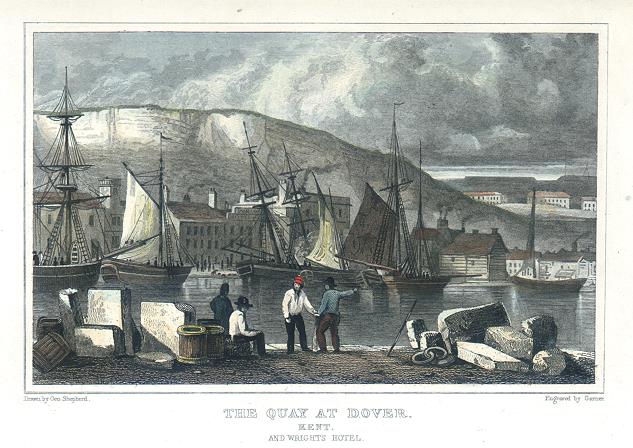2. Introducing Valentine Pepper
‘Apart from his ship-owning activities, John Fagg indulged in a limited though varied merchanting trade, as was evinced by the range of goods in the lower storehouse. There were tubs of tobacco from Bristol, boxes of bellows from King’s Lynn, cases of clay pipes from Poole, and violin bellies from London. Bales of woollens from Yorkshire, glassware from Newcastle, haberdashery and Manchester goods.

“Very good, sir,” the elder clerk replied promptly.
After nodding again, John Fagg sought out his right-hand man, to give the last word before returning home.
“And see about them lighters for the Martha, Valentine,” he shouted when he glimpsed that worthy.
Christian names may sometimes be fitting, but of all that might have been bestowed upon the ex-Navyman, Valentine was the least appropriate. Valentine Pepper was short, and nearly as broad; he had great cauliflower ears and a face tanned towards duskiness. Above all he had a definite squint which, when his barrel chest swelled with homeric laughter, caused him to look fantastic, and which also, when he was angered, gave him an expression of the most sinister. At the moment, too, his appearance was in no wise enhanced by a colourful black eye.
‘Captain’ Pepper – he had forced the title on the town some years before – hastily closed a cupboard door, so hastily that he caused the unmistakable chink of glass.
“What-o, me ‘earty!” he retorted unthinkingly.
“Valentine!” roared Mr Fagg.
“Sir,” the boatswain replied with sullen dignity.
His employer reiterated the order, to receive a reply couched in terms so concise as to make it evident that, whatever might be Captain Pepper’s private diversions, he was also exceedingly efficient.
“All arranged, sir,” he said smartly. “Everything shipshape, and twelve waggons chartered for when the stuff’s ashore.”
Mr Fagg grunted, made a few more inquiries on other points, and opened three letters which one of the the clerks had brought in from the post office.
He then indicated his intention to leave but, before doing so, glanced somewhat significantly at that lurid, half-closed eye.
“Her husband catch you, Valentine?” he observed conversationally.
“Sir!” Captain Pepper retorted bemusedly.
“Or was it her brother?” persisted his employer.
Possessing a physiognomy hardly lending itself to histrionics, the boatswain, attempting a pained expression, only succeeded in making himself all the more grotesque. But his manner of utterance, after he had solemnly cleared his throat, made it very clear that he felt he was resting under a most unjust implication. Before making his regular call at the Fountain Inn the previous evening, he continued loftily, he had been taking a meditative stroll in the vicinity of the Plain,
“The Plain!” suddenly chuckled John Fagg, tickled by the sober mention of this low-town area which harboured pushing schools and the rest.
Captain Pepper, more hurried now, rapidly finished his tale. It was an account of an encounter with a shapely female who apparently had not known the nature of the district in which she found herself and who had responded to the boatswain’s diplomatic warning with a well-delivered swing of her fist.
“But it’s the last bloody time, keel-haul me if it ain’t, sir,” he ended energetically, becoming the petty officer. “No more blasted Covent Garden nuns for me. Me, I’m for a-settling down with a nice little woman.”
Mr Fagg guffawed. “Made your selection yet, Valentine?” he asked.
Vividly and blasphemously his servant pointed out that as yet he had had little time. Getting spliced was a major article of war, and he was not going to board the first wench he espied. But when he saw the right piece of goods…
“I’ll take ‘er ‘fore she know the wind’s out of ‘er canvas,” he roared. “Me ‘an ‘er’ll be bubble and squeak afore she’s run up ‘er battle ensign. And what’s more…”
His master was smiling long after the warehouse was behind.
Mr Fagg took the other way out of Elizabeth Street, emerging into Limekiln Street at the corner where recently the Wesleyans had converted two dwelling-houses to make the first Dover Chapel for their denomination.
Soon he was in Snargate Street and once more passing the entrance to the Grand Military Shaft, nodding to several gentlemen or raising his hat to a number of ladies who passed into the bow-windowed houses margining the old thoroughfare. Further down he paused to examine the bills posted at the Playhouse, and later, on the opposite side, passed by Henry Rochefort’s commodious Jacobean mansion.
Then he was nearing Severus’s Gate and Bench Street, and thus not very far from home.’